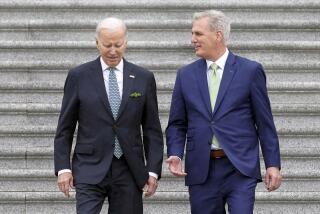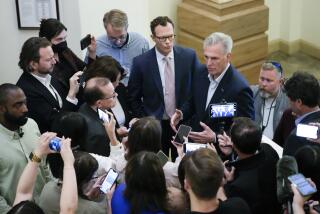WASHINGTON INSIGHT
- Share via
CAMPAIGN FALLOUT: Administration aides say that President Bush is serious about not making any major change in his Cabinet after the election, despite the debacle over the budget that Republican candidates complain is contributing to their dimmed prospects this year.
White House Chief of Staff John H. Sununu, criticized for his handling of the budget negotiations, apparently is safe. Bush aides say that replacing him would probably be seen as a sign of weakness on the President’s part. That leaves Budget Director Richard G. Darman the member of the budget triumvirate most likely to fall if the issue costs the GOP congressional seats.
Still, some Cabinet officers seem to want to change. Housing Secretary Jack Kemp reportedly would like to take the place of Carla Anderson Hills as U.S. trade representative, and Hills is widely believed to be interested in a Supreme Court appointment, should another vacancy occur.
COMMAND DECISION: While the Bush Administration says officially that perhaps 100,000 additional troops are needed because U.S. commanders need more flexibility in the Persian Gulf, Pentagon strategists concede there is a more fundamental factor: Washington does not believe it can rely on some allies to take part in any attack. U.S. allies have sent more than 100,000 troops to the region, but several of them have served notice that they will not go along with an American-led military offensive against Iraq.
CONTINUING CONFLICT: Friction between the White House and the Federal Reserve Board appears likely to intensify over the next few months as the economy declines.
The compromise budget bill passed by Congress last week and about to be signed by President Bush isn’t likely to ease the tension. Bush Administration officials bristled at the Fed’s token move to reduce interest rates last week, after the budget accord was reached. Administration strategists had hoped for a far sharper drop than the quarter-point decline that the Fed engineered, and many saw the action as the central bank thumbing its nose at Bush. Fed Chairman Alan Greenspan had hinted that interest rates would drop if a budget accord were approved.
Fed authorities contend, however, that the deficit-reduction package finally produced is so modest that it is hardly worth considering as a factor in the setting of money and credit policy. They warn that any official attempt to drive rates down would cause financial markets to worry that the Fed was abandoning its anti-inflation stance--and thus would send interest rates back up, even higher.
SECOND THOUGHTS: Justice David H. Souter’s first month on the Supreme Court appears to have given new encouragement to both sides of the heated debate over abortion laws.
Although Souter has not yet revealed his views on the constitutional status of abortion, his questioning of government attorneys in an abortion-related case last week left activists in both camps convinced that he leans toward their side. Despite the apparent conflict, however, court watchers concede that the real test won’t come until Souter actually rules on an abortion case. “Let’s wait to see how he votes,” one said.
More to Read
Get the L.A. Times Politics newsletter
Deeply reported insights into legislation, politics and policy from Sacramento, Washington and beyond. In your inbox twice per week.
You may occasionally receive promotional content from the Los Angeles Times.










